Foreign News
Europe ‘at turning point in history’, French president warns
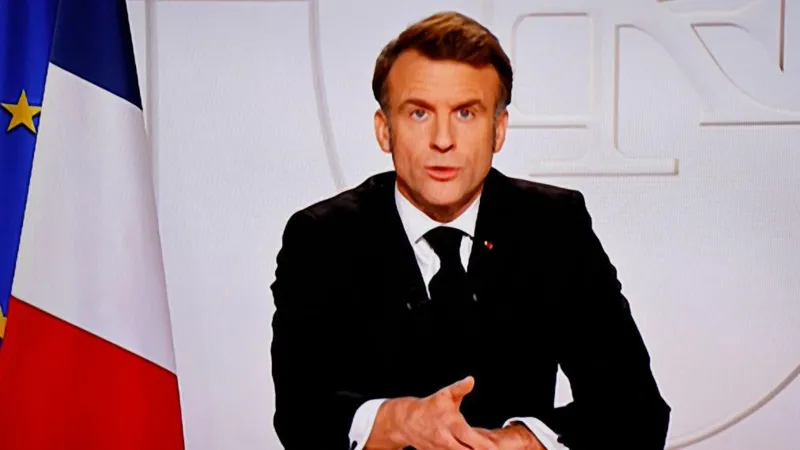
EU leaders are gathering in Brussels today [06] for a special council on defence, as France’s President Emmanuel Macron warned that the continent was at a “turning point of history”.
As well as rearmament, leaders are expected to discuss how the body can further support Kyiv in the face of US President Donald Trump’s announcement on Monday that he would suspend aid to Ukraine. Ukrainian President Volodymy Zelensky is invited to the summit.
Nerves have grown increasingly frayed across Europe since Trump and Zelensky’s showdown at the White House last week, and the rhetoric around Thursday’s summit leaves no doubt about the importance EU officials are ascribing to it.
Three years on since Russia’s full scale invasion of Ukraine, the Trump administration’s overtures to Russian President Vladimir Putin have left many in Europe concerned the continent would not be able to rely on US support for its security.
Washington’s decision on Wednesday topause intelligence sharing with Ukraine did nothing to allay those worries.
In a sign of the depth of concern, President Macron said France was open to discussing extending the protection offered by its nuclear arsenal to its European partners, during an address to the nation on Wednesday.
That followed a call from Friedrich Merz, likely to be Germany’s next chancellor, to discuss increased nuclear sharing.
Europe was facing a “clear and present danger on a scale that none of us have seen in our adult lifetime”, European Commission chief Ursula von der Leyen said, while European Council President António Costa said this was a “defining moment for Ukraine and European security”.
In a letter to European leaders, von der Leyen also said the continent had to “meet the moment” and “unleash our industrial and productive power and direct it to the goal of security”.
On Monday, von der Leyen announced an unprecedented defence package – dubbed ReArm Europe – and said that Europe was ready to “massively” boost its defence spending “with the speed and the ambition that is needed”.
Von der Leyen said the three proposals outlined in the ReArm Europe plan would both support Ukraine and “address the long-term need to take much more responsibility” for European security – likely referring to the fact many Europeans feel the continent can no longer automatically rely on the US to come to its aid.
The proposals include:
- Allowing countries to increase national deficit levels to give room for more defence spending
- €150bn (£125bn) in loans for defence investment in domains that could benefit the defence of the EU as a whole – for example, air and missile defence, anti-drone systems, and military mobility – helping pool demand, and reduce costs through joint procurement
- Allowing countries to redirect funds earmarked for cohesion policy programmes (policies aimed at levelling the differences between more and less advantaged regions) to defence spending
The European Investment Bank would also be allowed to finance military projects.
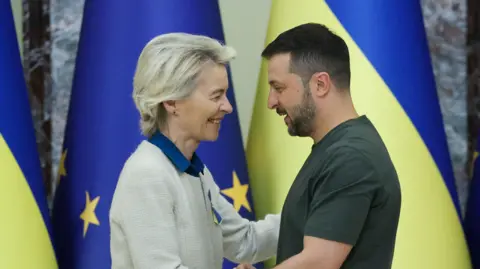
According to von der Leyen, the plan could free up a total of €800bn ($860bn; £670bn) in defence expenditure.
Many European leaders have signalled their support for swift, decisive action in regards to the continent’s security.
Donald Tusk, Poland’s prime minister, said the Commission’s plan represented “a fundamental shift”, while Lithuanian President Gitanas Nauseda said that the summit would give Europe the opportunity to show “whether it’s just a debate club or whether we can make decisions”.
But dissent from certain European leaders sympathetic to Moscow is expected.
Earlier this week, Slovakian Prime Minister Robert Fico said the EU’s “peace through strength” approach was “unrealistic”.
And in a letter to Costa, Hungary’s Viktor Orban demanded that Ukraine not be mentioned in any written conclusions following the summit.
Orban – who has repeatedly attempted to block EU aid to Ukraine and has praised Trump for “standing bravely for peace” – said there was now a “strategic divide… between the majority of Europe and the USA”.
“One side insists on prolonging the war in Ukraine, while the other seeks an end to the conflict,” he added.
Yet Orban left the door open for a “greater probability for cooperation” with other leaders over issues of common security and defence.
While Thursday’s crisis summit is taking place in Brussels, UK Defence Secretary John Healey will be in Washington for discussions with his counterpart Pete Hegseth on the US decision to pause intelligence sharing with Ukraine.
Their bilateral meeting will focus on a possible peace plan while efforts continue to bridge a transatlantic rift over Kyiv’s future security.
Perhaps in a final bid to try and achieve unity ahead of the summit, Emmanuel Macron – who has positioned himself at the centre of the EU’s efforts to bridge the gap between Kyiv and Washington – invited Orban to have dinner in Paris on Wednesday evening.
The two leaders met immediately after the French president gave a sombre address to the nation in which he said that France and Europe needed to be ready if the US was no longer by their side.
“We have to be united and determined to protect ourselves,” Macron said. He added that the future of Europe could not be tied to Washington or Moscow, and said that while he “wanted to believe that the US will stay by our side, we have to be ready for this not to be the case”.
The French president plans to hold a meeting of European army chiefs in Paris next week.
Macron said that “decisive steps” would be taken in Brussels, leaving European countries “more ready to defend and protect themselves”.
“The moment calls for unprecedented decisions,” he concluded.
[BBC]
Features
A wage for housework? India’s sweeping experiment in paying women

In a village in the central Indian state of Madhya Pradesh, a woman receives a small but steady sum each month – not wages, for she has no formal job, but an unconditional cash transfer from the government.
Premila Bhalavi says the money covers medicines, vegetables and her son’s school fees. The sum, 1,500 rupees ($16: £12), may be small, but its effect – predictable income, a sense of control and a taste of independence – is anything but.
Her story is increasingly common. Across India, 118 million adult women in 12 states now receive unconditional cash transfers from their governments, making India the site of one of the world’s largest and least-studied social-policy experiments.
Long accustomed to subsidising grain, fuel and rural jobs, India has stumbled into something more radical: paying adult women simply because they keep households running, bear the burden of unpaid care and form an electorate too large to ignore.
Eligibility filters vary – age thresholds, income caps and exclusions for families with government employees, taxpayers or owners of cars or large plots of land.
“The unconditional cash transfers signal a significant expansion of Indian states’ welfare regimes in favour of women,” Prabha Kotiswaran, a professor of law and social justice at King’s College London, told the BBC.
The transfers range from 1,000-2,500 rupees ($12-$30) a month – meagre sums, worth roughly 5-12% of household income, but regular. With 300 million women now holding bank accounts, transfers have become administratively simple.
Women typically spend the money on household and family needs – children’s education, groceries, cooking gas, medical and emergency expenses, retiring small debts and occasional personal items like gold or small comforts.
What sets India apart from Mexico, Brazil or Indonesia – countries with large conditional cash-transfer schemes – is the absence of conditions: the money arrives whether or not a child attends school or a household falls below the poverty line.
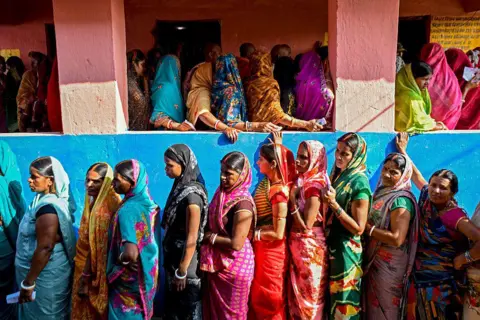
Goa was the first state to launch an unconditional cash transfer scheme to women in 2013. The phenomenon picked up just before the pandemic in 2020, when north-eastern Assam rolled out a scheme for vulnerable women. Since then these transfers have turned into a political juggernaut.
The recent wave of unconditional cash transfers targets adult women, with some states acknowledging their unpaid domestic and care work. Tamil Nadu frames its payments as a “rights grant” while West Bengal’s scheme similarly recognises women’s unpaid contributions.
In other states, the recognition is implicit: policymakers expect women to use the transfers for household and family welfare, say experts.
This focus on women’s economic role has also shaped politics: in 2021, Tamil actor-turned-politician Kamal Haasan promised “salaries for housewives”. (His fledgling party lost.) By 2024, pledges of women-focused cash transfers helped deliver victories to political parties in Maharashtra, Jharkhand, Odisha, Haryana and Andhra Pradesh.
In the recent elections in Bihar, the political power of cash transfers was on stark display. In the weeks before polling in the country’s poorest state, the government transferred 10,000 rupees ($112; £85) to 7.5 million female bank accounts under a livelihood-generation scheme. Women voted in larger numbers than men, decisively shaping the outcome.
Critics called it blatant vote-buying, but the result was clear: women helped the Bharatiya Janata Party (BJP)-led coalition secure a landslide victory. Many believe this cash infusion was a reminder of how financial support can be used as political leverage.
Yet Bihar is only one piece of a much larger picture. Across India, unconditional cash transfers are reaching tens of millions of women on a regular basis.
Maharashtra alone promises benefits for 25 million women; Odisha’s scheme reaches 71% of its female voters.
In some policy circles, the schemes are derided as vote-buying freebies. They also put pressure on state finances: 12 states are set to spend around $18bn on such payouts this fiscal year. A report by think-tank PRS Legislative Research notes that half of these states face revenue deficits – this happens when a state borrows to pay regular expenses without creating assets.
But many argue they also reflect a slow recognition of something India’s feminists have argued for decades: the economic value of unpaid domestic and care work.
Women in India spent nearly five hours a day on such work in 2024 – more than three times the time spent by men, according to the latest Time Use Survey. This lopsided burden helps explain India’s stubbornly low female labour-force participation. The cash transfers, at least, acknowledge the imbalance, experts say.
Do they work?
Evidence is still thin but instructive. A 2025 study in Maharashtra found that 30% of eligible women did not register – sometimes because of documentation problems, sometimes out of a sense of self-sufficiency. But among those who did, nearly all controlled their own bank accounts.
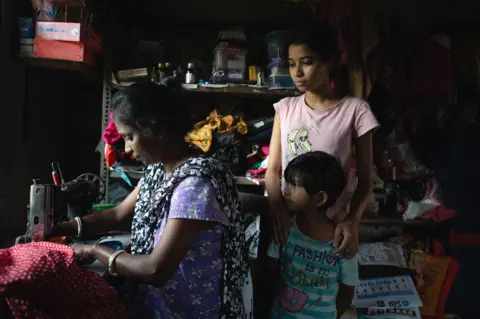
A 2023 survey in West Bengal found that 90% operated their accounts themselves and 86% decided how to spend the money. Most used it for food, education and medical costs; hardly transformative, but the regularity offered security and a sense of agency.
More detailed work by Prof Kotiswaran and colleagues shows mixed outcomes.
In Assam, most women spent the money on essentials; many appreciated the dignity it afforded, but few linked it to recognition of unpaid work, and most would still prefer paid jobs.
In Tamil Nadu, women getting the money spoke of peace of mind, reduced marital conflict and newfound confidence – a rare social dividend. In Karnataka, beneficiaries reported eating better, gaining more say in household decisions and wanting higher payments.
Yet only a sliver understood the scheme as compensation for unpaid care work; messaging had not travelled. Even so, women said the money allowed them to question politicians and manage emergencies. Across studies, the majority of women had full control of the cash.
“The evidence shows that the cash transfers are tremendously useful for women to meet their own immediate needs and those of their households. They also restore dignity to women who are otherwise financially dependent on their husbands for every minor expense,” Prof Kotiswaran says.
Importantly, none of the surveys finds evidence that the money discourages women from seeking paid work or entrench gender roles – the two big feminist fears, according to a report by Prof Kotiswaran along with Gale Andrew and Madhusree Jana.
Nor have they reduced women’s unpaid workload, the researchers find. They do, however, strengthen financial autonomy and modestly strengthen bargaining power. They are neither panacea nor poison: they are useful but limited tools, operating in a patriarchal society where cash alone cannot undo structural inequities.

What next?
The emerging research offers clear hints.
Eligibility rules should be simplified, especially for women doing heavy unpaid care work. Transfers should remain unconditional and independent of marital status.
But messaging should emphasise women’s rights and the value of unpaid work, and financial-literacy efforts must deepen, researchers say. And cash transfers cannot substitute for employment opportunities; many women say what they really want is work that pays and respect that endures.
“If the transfers are coupled with messaging on the recognition of women’s unpaid work, they could potentially disrupt the gendered division of labour when paid employment opportunities become available,” says Prof Kotiswaran.
India’s quiet cash transfers revolution is still in its early chapters. But it already shows that small, regular sums – paid directly to women – can shift power in subtle, significant ways.
Whether this becomes a path to empowerment or merely a new form of political patronage will depend on what India chooses to build around the money.
[BBC]
Foreign News
Indonesia counts human cost as more climate change warnings sounded
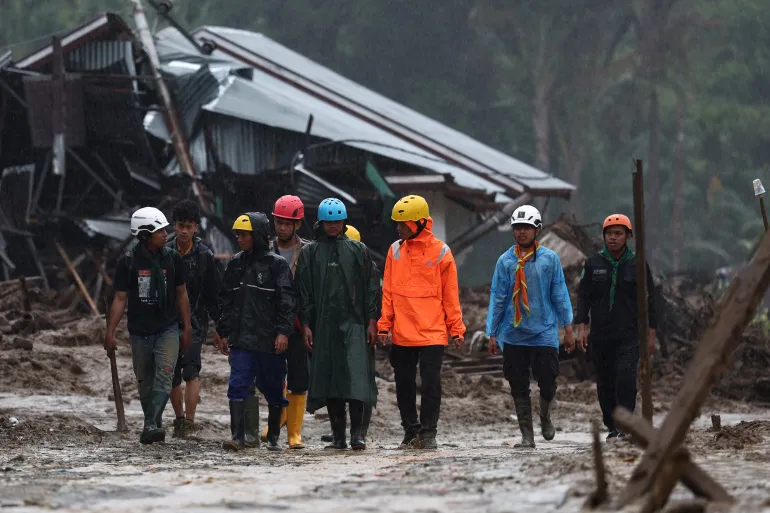
Nearly 1,000 people have been killed, and close to one million displaced, Indonesia has said a week after torrential rains triggered catastrophic floods and landslides.
The National Disaster Management Agency (BNPB) reported late on Sunday that 961 people had been killed, with 234 people missing and about 5,000 injured across the Aceh, North Sumatra and West Sumatra provinces.
The agency also recorded damage to more than 156,000 homes, and 975,075 people had taken refuge in temporary shelters.
Floodwaters have begun to recede in several coastal districts, although large areas in the central highlands are still cut off, BNPB said. However, heavy rain is forecast for parts of the island in the coming days, raising concerns for displaced people.
Indonesia’s rainy season, which usually peaks between November and April, frequently brings severe flooding.
Environmental groups and disaster specialists have warned for years that rapid deforestation, unregulated development and degraded river basins have increased the risks.
Several other countries in Southeast Asia, including Sri Lanka and Thailand, have been hit hard by storms and floods in recent weeks.
Risk to billions
The Asian Water Development Outlook 2025, published by the Asian Development Bank (ADB) on Monday, warned that the impact of climate change on Asia’s water systems poses a risk to billions.
The research said accelerating ecosystem decline and funding shortfalls for investment in critical water infrastructure threaten to plunge many in the sprawling region into water insecurity.
That could jeopardise gains over the past 12 years that have seen more than 60 percent of Asia-Pacific’s population – about 2.7 billion people – escape extreme water insecurity, the report says.
“Asia’s water story is a tale of two realities, with monumental achievements on water security coupled with rising risks that could undermine this progress,” said Norio Saito, the ADB’s senior director for water and urban development.
“Without water security, there is no development,” Saito said, adding that the report showed that urgent action was needed to restore ecosystem health, strengthen resilience, improve water governance, and deploy innovative finance to deliver long-term water security.
Rising disaster threat
The report said extreme weather events such as storm surges, rising sea levels, and saltwater intrusion, along with rising water-related disasters, threaten the region, which already accounts for more than 40 percent of the world’s floods.
That includes the disasters that ravaged Indonesia and other countries in the region in recent weeks.
From 2013 to 2023, the Asia Pacific region experienced 244 major floods, 104 droughts, and 101 severe storms, causing widespread damage to life and property and undermining crucial development gains.
The report said accelerating ecosystem decline was also a serious threat to water security in the region, with rivers, aquifers, wetlands and forests that sustain long-term water security deteriorating rapidly.
It said water ecosystems were deteriorating or stagnating in 30 of the 50 Asian countries it looked at, as they face threats from pollution, unchecked development and the conversion of land to other uses.
Under investment in water infrastructure is another threat to water security.
Asian nations will need to spend $4 trillion for water and sanitation between now and 2040, an outlay of about $250bn a year, the report said.
Currently, governments are collectively spending about 40 percent of that, an annual shortfall of more than $150bn.
[Aljazeera]
Foreign News
Benin coup thwarted by loyalist troops, president tells nation
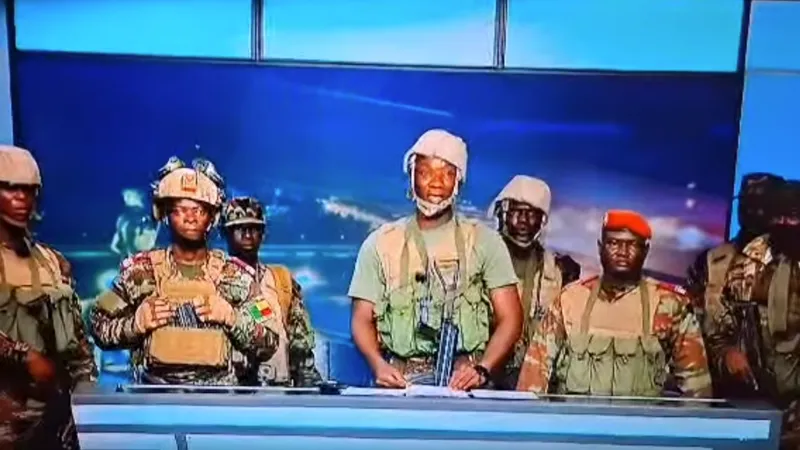
Benin’s president has appeared on television to reassure citizens of the West African nation that the situation was now “totally under control” following an attempted coup earlier in the day.
“I would like to commend the sense of duty demonstrated by our army and its leaders, who have remained… loyal to the nation,” Patrice Talon said, looking calm during the live evening broadcast.
The government said it had thwarted the mutiny hours after a group of soldiers declared a takeover on national television.
Later in the afternoon, huge explosions were heard in Cotonou, Benin’s largest city and seat of government. They were thought to have been the result of an air strike.
Prior to the explosions, flight-tracking data showed that three aircraft had entered Benin’s airspace from neighbouring Nigeria before returning home.
A spokesman for Nigeria’s president later confirmed that its fighter jets had gone in to “take over the airspace to help dislodge the coup plotters from the national TV and a military camp where they had regrouped”.
There have been a series of coups in West Africa before Sunday’s thwarted attempt in Benin, heightening fears that the security of the region could worsen.
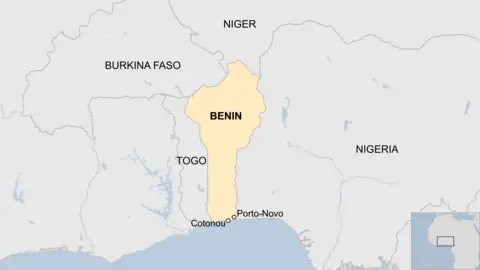
Benin, a former French colony, has been regarded as one of Africa’s more stable democracies. But Talon has faced accusations of suppressing criticism of his policies.
The nation is one of the continent’s largest cotton producers, but ranks among the world’s poorest countries.
Nigeria, Benin’s large neighbour to the east, has described the coup attempt as a “direct assault on democracy”.
“This commitment and mobilisation enabled us to defeat these opportunists and avert disaster for our country. This treachery will not go unpunished,” he added.
“I would like to reassure you that the situation is completely under control and therefore invite you to go about your business peacefully this evening.”
It is not clear if there have been casualties, but the president expressed his condolences “to the victims of this senseless adventure, as well as to those still being held by fleeing mutineers”.
Earlier, government spokesperson Wilfried Leandre Houngbedji told news agency Reuters that 14 people had been arrested in connection with the attempted coup.
A journalist in Benin told the BBC that, of those reportedly arrested, 12 are believed to have stormed the offices of the national TV station – including a soldier who had previously been sacked.
Eyewitnesses told the BBC gunfire was heard near the presidential residence early on Sunday morning, as a group of soldiers announced on national TV that they were suspending the constitution.
They also said some journalists working for the state broadcaster had been held hostage for a few hours.
The French and Russian embassies urged their citizens to remain indoors, while the US embassy’s advice was to stay away from Cotonou, especially the area around the presidential compound.
The rebel soldiers, led by Lt Col Pascal Tigri, justified their actions by criticising Talon’s management of the country, complaining first about his handling of the “continuing deterioration of the security situation in northern Benin”.
Benin’s army has suffered losses near its northern border with insurgency-hit Niger and Burkina Faso in recent years, as jihadist militants linked to Islamic State and al-Qaeda spread southwards.
The soldier’s statement cited “the ignorance and neglect of the situation of our brothers in arms who have fallen at the front and, above all, that of their families, abandoned to their sad fate by Mr Patrice Talon’s policies”.
The rebels also hit out at cuts in health care, including the cancellation of state-funded kidney dialysis, and taxes rises, as well as curbs on political activities.
Talon, who is regarded as a close ally of the West, is due to step down next year after completing his second term in office, with elections scheduled for April.
A businessman known as the “king of cotton”, he first came to power in 2016. He promised not to seek a third term, despite Benin’s current two-term limit for presidencies, and has endorsed Finance Minister Romuald Wadagni as his successor.
Talon has been praised by his supporters for overseeing economic development, but his government has also been criticised for suppressing dissenting voices.
In October, Benin’s electoral commission barred the main opposition candidate from standing on the grounds that he did not have enough sponsors.
Last month, constitutional amendments were passed by MPs, including the creation of a second parliamentary chamber, the Senate.
Terms for elected officials were extended from five to seven years, but the presidential two-term limit remained in place.
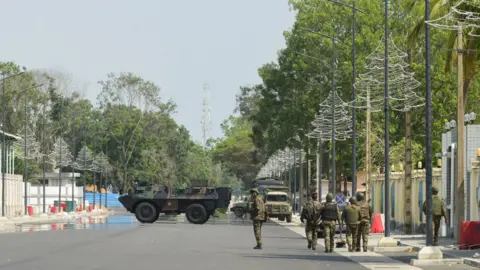
Sunday’s attempted coup comes just over a week after Guinea-Bissau’s President Umaro Sissoco Embaló was overthrown – though some regional figures have questioned whether this was staged.
In recent years, West Africa has also seen coups in Burkina Faso, Guinea, Mali and Niger, prompting concerns about the region’s stability.
Russia has strengthened its ties with these Sahel countries over recent years – and Burkina Faso, Mali and Niger have left the West African regional bloc Ecowas to form their own group, the Alliance of Sahel States.
News of the attempted takeover in Benin was hailed by several pro-Russian social media accounts, according to BBC Monitoring.
Ecowas and the African Union (AU) have both condemned the coup attempt.
A contingent from Ecowas’s standby force is to be deployed to preserve the “constitutional order and the territorial integrity of the Republic of Benin”, the regional bloc has said in a statement.
AU Commission chair Mahmoud Ali Yousouf reiterated the pan-African organisation’s “zero tolerance stance toward any unconstitutional change of government, regardless of context or justification”.
[BBC]
-
News6 days ago
Lunuwila tragedy not caused by those videoing Bell 212: SLAF
-

 News1 day ago
News1 day agoOver 35,000 drug offenders nabbed in 36 days
-

 News5 days ago
News5 days agoLevel III landslide early warning continue to be in force in the districts of Kandy, Kegalle, Kurunegala and Matale
-

 Business3 days ago
Business3 days agoLOLC Finance Factoring powers business growth
-

 News3 days ago
News3 days agoCPC delegation meets JVP for talks on disaster response
-

 News3 days ago
News3 days agoA 6th Year Accolade: The Eternal Opulence of My Fair Lady
-

 News1 day ago
News1 day agoRising water level in Malwathu Oya triggers alert in Thanthirimale
-

 Midweek Review6 days ago
Midweek Review6 days agoHouse erupts over Met Chief’s 12 Nov unheeded warning about cyclone Ditwah













